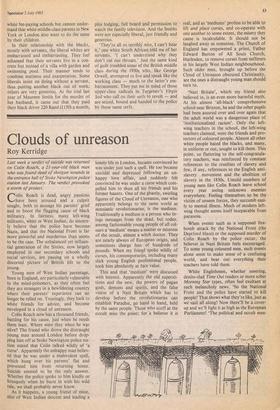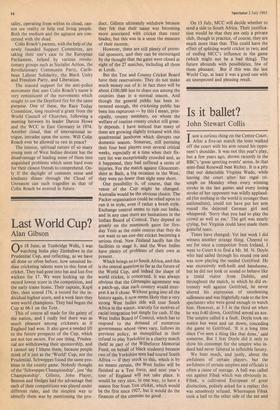Clouds of unreason
Roy Kerridge
Last week a verdict of suicide was returned on Colin Roach, a 21-year-old black man who was found dead of shotgun wounds in the entrance half of Stoke Newington police station last January. The verdict provoked a storm of protect.
riolin Roach is dead, angry passions %.../ have been aroused and a culprit sought, both to assuage his parents' grief and to boost the flagging cause of black militancy. In fairness, many left-wing militants, white or West Indian, do sincere- ly believe that the police have become- Nazis, and that the National Front is far more powerful and murderous than seems to be the case. The unbalanced yet influen- tial generation of the Sixties, now largely employed in our secondary schools and social services, are passing on a wholly distorted picture of British life to the young.
Young men of West Indian parentage, born in England, are particularly vulnerable to the mind-poisoners, as they often feel they are strangers in a bewildering country where their parents' experience can no longer be relied on. Trustingly, they look to white friends for advice, and become enveloped in a cloud of unreason.
Colin Roach now has a thousand friends, battling for his cause, just when he needs them least. Where were they when he was alive? The friend who drove the distraught young man around London before drop- ping him off at Stoke Newington police sta- tion stated that Colin talked wildly of 'a curse'. Apparently the unhappy man believ- ed that he was under a malevolent spell, which hung over his parents' flat and prevented him from returning home. Suicide seemed to be the only answer. Whether the police spoke to him kindly or brusquely when he burst in with his wild tale, we shall probably never know.
As it happens, a young friend of mine, also of West Indian descent and leading a lonely life in London, became convinced he was under just such a spell. He too became suicidal and depressed following an un- happy love affair, and suddenly felt convinced he was under a curse which com- pelled him to shun all his friends and his former haunts. One of the ghastly, swirling figures of the Cloud of Unreason, one who apparently belongs to the same world as messianic revolutionaries, is the medium. Traditionally a medium is a person who br- ings messages from the dead, but today, among fashionable young people of all col- ours a 'medium' means a master or mistress of the occult, almost a witch doctor. They are nearly always of European origin, and sometimes charge fees of hundreds of pounds. When my friend spoke wildly of curses, his contemporaries, including many slick young English professional people, took him absolutely at face value.
This and that 'medium' were discussed with interest. Apparently the old supersti- tions and the new, the powers of pagan gods, demons and spirits, and the false vision of a Nazi Britain which has to develop before the revolutionaries can establish Paradise, go hand in hand, held by the same people. Those who scoff at the occult miss the point; for a believer it is real, and as 'mediums' profess to be able to lift and place curses, and co-operate with one another to some extent, the misery they cause is incalculable. It should not be laughed away as nonsense. The Church of England has empowered a priest, Father Edward Burton of All Souls Church, Harlesden, to remove curses from sufferers in his largely West Indian neighbourhood. Such older men, brought up before the Cloud of Unreason obscured Christianity, are the ones a distraught young man should turn to.
'Nazi Britain', which my friend also believed in, is an even more harmful myth. At his almost 'all-black' comprehensive school near Brixton, he and the other pupils had been assured over and over again that the adult world was a dangerous place of 'institutionalised racism'. Only the left- wing teachers in the school, the left-wing teachers claimed, were the friends and pro- tectors of coloured people. Almost all other white people hated the blacks, and many, in uniform or out, sought to kill them. This point, so flattering to the self-congratula- tory teachers, was reinforced by constant references to the cruelties of slavery and few, if any, references to the English anti- slavery movement and the abolition of slavery in the 1830s. Untold numbers of young men like Colin Roach leave school every year seeing unknown enemies everywhere. Feeling themselves to be the victim of unseen forces, they succumb easi- ly to mental illness. Much of modern left- wing thought seems itself inseparable from paranoia.
When events such as a supposed fire- bomb attack by the National Front (the Deptford blaze) or the supposed murder of Colin Roach by the police occur, the believer in Nazi Britain feels encouraged. To some young coloured men, such events alone seem to make sense of a confusing world, and bear out everything their teachers have told them.
White Englishmen, whether sneering, denim-clad Time Out readers or more sober Morning Star types, often feel exultant at such melancholy news. 'So the National Front and the police have started to kill people! That shows what they're like, just as we said all along! Now there'll be a cover- up and we'll fight it as high as the European Parliament! 'The political and occult men-
tality, operating from within its cloud, can- not see reality or help real living people. Both the medium and the agitator are con- cerned with the dead.
Cohn Roach's parents, with the help of the newly founded Support Committee, are taking their son's case to the European Parliament, helped by various revolu- tionary groups such as Socialist Action, the Revolutionary Communist Party, Carib- bean Labour Solidarity, the Black Unity and Freedom Party, and Liberation.
The massed support for the anti-police movement that uses Colin Roach's name is very reminiscent of the movements which sought to use the Deptford fire for the same purpose. One of these, the Race Today Committee, long received a grant from the World Council of Churches, following a meeting between its leader Darcus Howe and the WCC in East Germany in 1974. Another cloud, that of international in- trigue, intrudes upon the scene. Will Colin Roach ever be allowed to rest in peace?
The intense, spiritual nature of so many young men of West Indian descent has the disadvantage of leading some of them into anguished problems which seem hard even for their closest friends to comprehend. On- ly, if the daylight of common sense and kindness shines through the Cloud of Unreason can such tragedies as that of Colin Roach be averted in future.







































 Previous page
Previous page